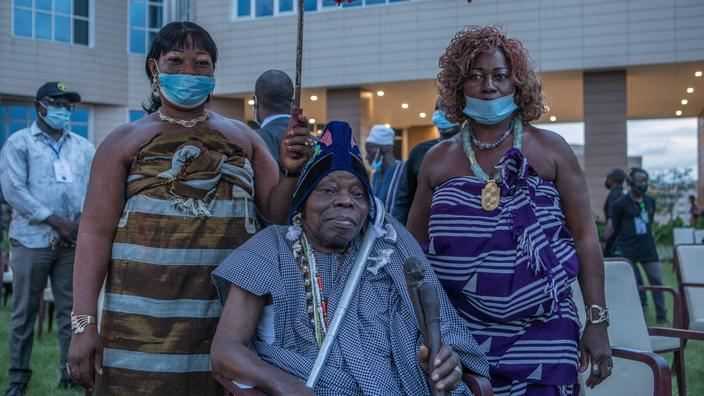The king of Abomey, ancestral kingdom in southern Benin, Dadah Kêfa Sagbadjou Glèlè died last week, a high dignitary of the royalty of the small West African country told AFP on Thursday 23 December. .
Read alsoFrance-Benin: farewell to restored works
“Royalty is in mourning. The king of Abomey, the sovereign Kêfa Sagbadjou Glèlè joined his ancestors, Friday, December 17», Declared to AFP Dako Kpogbémambou Vovoweyçonsin, high-dignitary of the royalty in the department of Zou (south). “We went to the palace this morning to share the bad news“, He explained, before continuing in a very moved voice:”I am in total dismay“.
“Night has fallen on Abomey”
According to local customs and traditions, it is forbidden to say that the king “is deadOut of respect for its sacredness. We must use more nuanced expressions such as “night has fallen on Abomey», The capital of this four-century-old kingdom, formerly known as the kingdom of Dahomey (former name of Benin).
Enthroned in January 2019 at the age of 90, Dadah Sagbadjou Glèlè, a priest by training, succeeded former king Dadah Dédjalagni Agoli-Agbo, who died in July 2018 after nearly thirty years of reign. The sovereign’s death comes a month after his last public appearance on the occasion of the return to Cotonou, the economic capital, of 26 royal treasures from Abomey looted by French colonial troops in the 19th century. After the ceremony, he had expressed his deep emotion to AFP: “I cannot explain the joy that embraces me. These objects were intended from their departure for a return. Sooner or later, they had to return so that the words spoken by our ancestors could be fulfilled.“
Read alsoBefore their return to Benin, royal treasures of Abomey exhibited at the Quai Branly museum
For the time being, no date has been communicated for the organization of public tributes, ceremonies and rituals relating to this death which traditionally precede the designation of a new king. Heir to a long line of monarchs, Dadah Sagbadjou Glèlè was the last direct grandson of King Glèlè, father of King Béhanzin who had been deported during the colonial struggle against France, putting an end to the kingdom’s political power.
Nowadays, the Beninese Constitution does not recognize political power in kings and other traditional chiefs. But they retain a great influence on the life of the city. In August 2018, some 30,000 people, including many members of the government and deputies, came to worship in Abomey for a final tribute to Dadah Dédjalagni Agoli-Agbo. After his accession to the throne in 1989, this popular king had worked on the renovation of several palaces, some of which have become a tourist priority.
